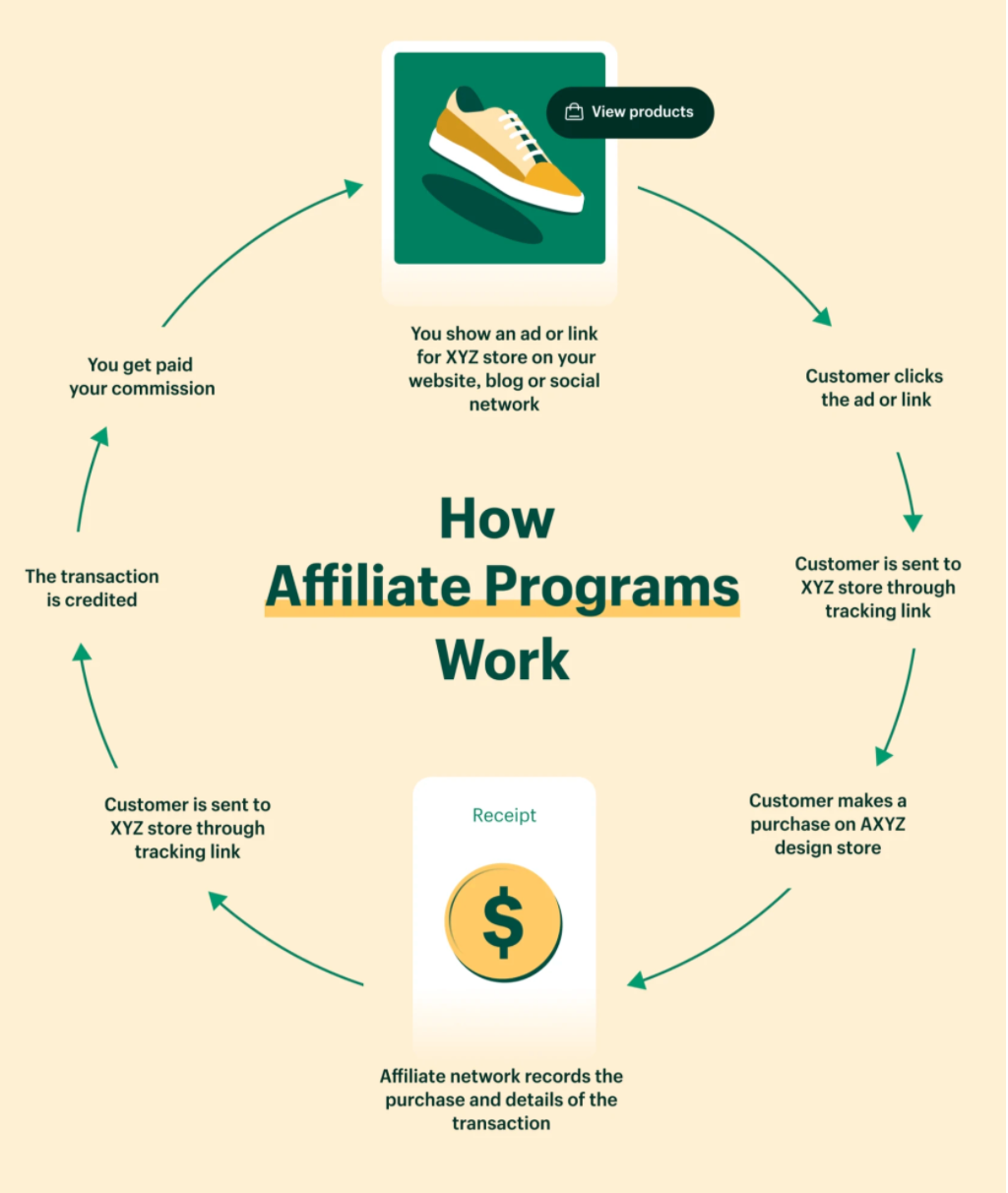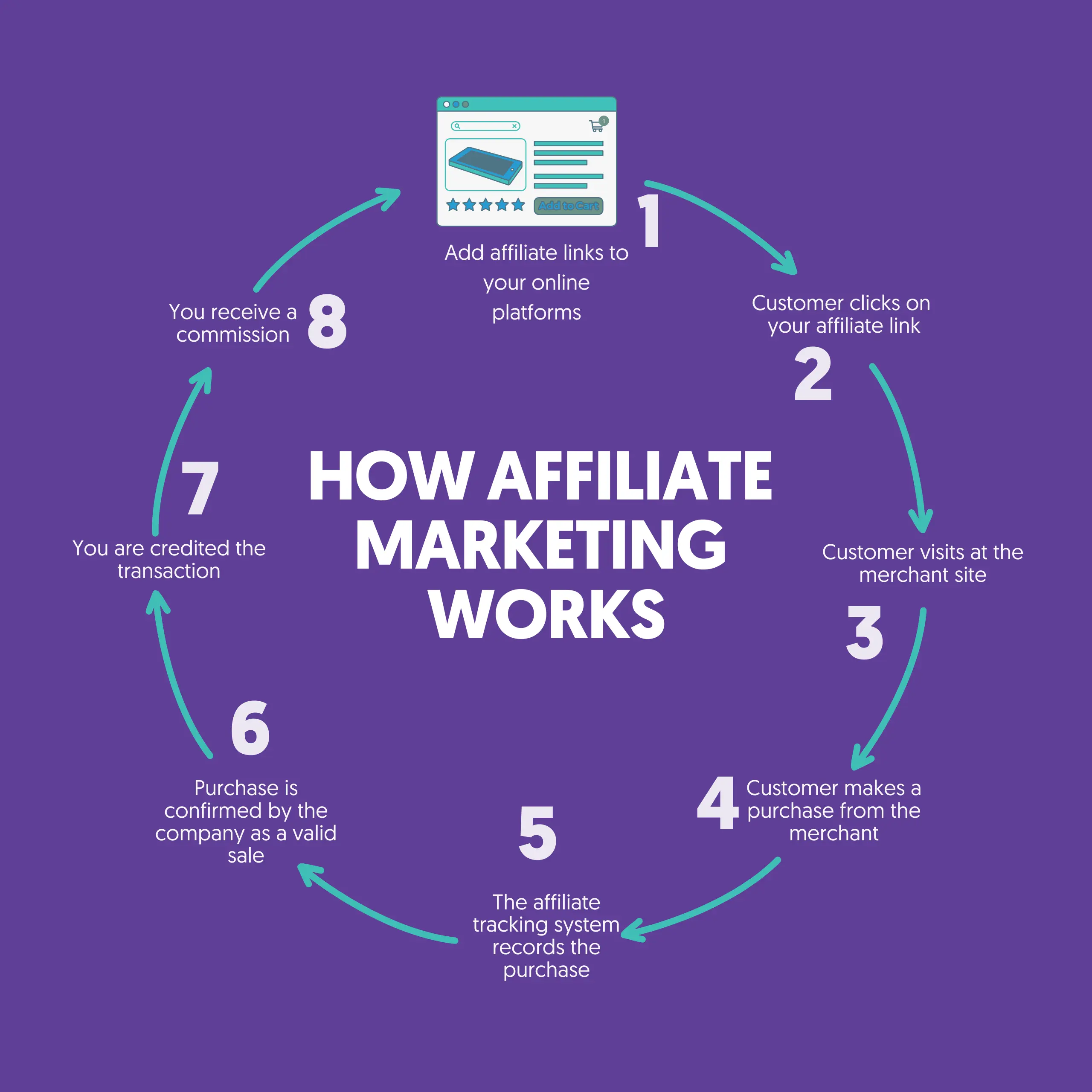How Affiliate Marketing Works Step by Step: Unlock Profits!
Affiliate marketing is a process where an affiliate earns a commission for promoting other people’s or company’s products. It involves finding a product, promoting it to others, and earning a piece of the profit for each sale that is made.
Affiliate marketing has become a popular way for individuals to make money online. It allows people to earn a commission by promoting products they believe in and recommending them to others. The process involves finding a product or service to promote, signing up for an affiliate program, and obtaining a unique affiliate link.
The affiliate then shares the link with their audience, who can click on it and purchase the product. The affiliate earns a commission for each sale made through their link. The success of affiliate marketing depends on the affiliate’s ability to effectively promote the product and build trust with their audience.
The Basics Of Affiliate Marketing
Affiliate marketing is a popular and effective way for businesses to promote their products or services by partnering with individuals or other businesses (affiliates) who promote these products or services in exchange for a commission for every sale made through their referral. Understanding the basics of affiliate marketing is crucial for anyone looking to get started in this industry.
Decoding The Affiliate Marketing Model
Affiliate marketing follows a simple yet powerful model. A business (merchant) provides affiliates with unique tracking links or promo codes to promote their products or services. When a customer makes a purchase through an affiliate’s link or code, the affiliate earns a commission. This commission is a percentage of the sale price or a fixed amount agreed upon between the merchant and the affiliate.
Key Players In The Affiliate Marketing Ecosystem
- Merchant: The business that offers products or services to be promoted by affiliates.
- Affiliate: The individual or business that promotes the merchant’s products or services in exchange for a commission.
- Customer: The person who makes a purchase through the affiliate’s promotional efforts.
- Affiliate Network: An intermediary platform that connects merchants with affiliates and facilitates tracking and payment processes.
Setting The Stage: Choose Your Niche
A crucial first step in affiliate marketing is choosing the right niche. Your niche will determine the audience you target and the products you promote. It’s essential to select a niche that aligns with your interests, knowledge, and the needs of your potential customers. Let’s delve into the importance of selecting the right niche and the research and analysis involved in this step.
Importance Of Selecting The Right Niche
Choosing the right niche is paramount for the success of your affiliate marketing endeavors. When you focus on a specific niche, you can tailor your content and promotions to cater to the needs and preferences of your audience. This targeted approach increases the likelihood of converting leads into sales, as you are addressing a more receptive and engaged audience.
Research And Analysis For Niche Selection
Before committing to a niche, conducting thorough research and analysis is crucial. Start by identifying your areas of interest, expertise, and passion. Evaluate the potential profitability of different niches by considering the demand for related products or services and the level of competition. Additionally, use keyword research tools to gauge the search volume and competition for relevant keywords within your chosen niches. This data-driven approach will help you make an informed decision when selecting your niche.
Finding The Right Affiliate Programs
Discovering suitable affiliate programs is crucial in understanding the step-by-step process of affiliate marketing. By exploring various programs, you can determine the best fit for your niche and audience, leading to successful partnerships and increased revenue. Researching and selecting the right programs is the foundation for a profitable affiliate marketing journey.
As an affiliate marketer, finding the right affiliate programs is crucial to your success. You want to promote products that are relevant to your audience and will provide you with a decent commission. In this section, we will discuss the criteria for choosing affiliate programs and the top platforms to find affiliate offers.Criteria For Choosing Affiliate Programs
When choosing affiliate programs, it is important to consider the following criteria:| Relevance: | Choose products that are relevant to your niche and audience. |
| Commission: | Look for programs that offer a decent commission rate. |
| Cookie Duration: | Choose programs with longer cookie durations to increase your chances of earning a commission. |
| Support: | Ensure that the affiliate program provides adequate support and resources for their affiliates. |
Top Platforms To Find Affiliate Offers
Here are the top platforms to find affiliate offers:- Amazon Associates: Amazon offers a wide range of products and a user-friendly platform for affiliates.
- ShareASale: ShareASale has over 4,000 merchant programs to choose from and provides real-time tracking and reporting.
- ClickBank: ClickBank is a popular platform for digital products with high commission rates.
- CJ Affiliate: CJ Affiliate (formerly Commission Junction) has over 3,000 merchant programs and provides a variety of marketing tools.
- Rakuten Marketing: Rakuten Marketing (formerly Linkshare) offers a large network of merchants and a user-friendly platform.

Credit: www.reliablesoft.net
Creating Your Affiliate Platform
When it comes to affiliate marketing, creating your own affiliate platform is an essential step. This is where you will have complete control over your affiliate program and can track the performance of your affiliates. In this section, we will explore how to build a website as the foundation of your affiliate platform and alternative platforms you can consider for affiliate marketing.
Building A Website: The Foundation
Building a website is the first step in creating your affiliate platform. A well-designed and user-friendly website will not only attract potential affiliates but also provide them with the necessary information and tools to promote your products or services effectively.
To build your website, you can follow these steps:
- Choose a domain name: Select a domain name that is relevant to your niche and easy to remember. It should also reflect your brand identity.
- Select a hosting provider: Choose a reliable hosting provider that offers good uptime and fast loading speed for your website.
- Install a content management system (CMS): Install a CMS like WordPress, which is user-friendly and allows you to easily manage your website content.
- Design your website: Select a theme or template that aligns with your brand and customize it to create a unique look and feel.
- Create relevant content: Develop high-quality and SEO-optimized content that provides value to your target audience.
- Add affiliate marketing features: Install and configure affiliate marketing plugins or software to enable tracking, reporting, and commission management.
- Optimize for SEO: Implement SEO best practices to improve your website’s visibility in search engine results.
Alternative Platforms For Affiliate Marketing
While building your own website is a popular choice for creating an affiliate platform, there are alternative platforms you can consider as well. These platforms provide ready-made solutions and can be a good option if you don’t want to handle the technical aspects of setting up a website.
Here are a few alternative platforms for affiliate marketing:
- Affiliate networks: Joining an affiliate network allows you to connect with a wide range of advertisers and choose from a variety of products or services to promote.
- E-commerce platforms: Some e-commerce platforms offer built-in affiliate marketing features, allowing you to set up an affiliate program directly within your online store.
- Third-party affiliate software: There are third-party affiliate software options available that provide comprehensive affiliate management features, including tracking, reporting, and payment processing.
Before selecting an alternative platform, consider factors such as the platform’s reputation, commission structure, available products or services, and the level of control you will have over your affiliate program.
Content Is King: Crafting Your Strategy
When it comes to affiliate marketing, content plays a crucial role in driving sales and attracting customers. Crafting a solid content strategy is essential for affiliate marketers to succeed in their campaigns. In this section, we will explore the different types of content that effectively drive affiliate sales and discuss important SEO practices to optimize your content for maximum visibility.
Types Of Content That Drive Affiliate Sales
Creating high-quality content is the foundation of successful affiliate marketing. By understanding the types of content that drive affiliate sales, you can tailor your strategy to meet the needs and preferences of your target audience.
Here are some types of content that have proven to be effective in boosting affiliate sales:
- Product Reviews: Detailed and unbiased product reviews help users make informed purchasing decisions. By highlighting the benefits and features of the affiliate products, you can build trust with your audience and encourage them to make a purchase.
- Tutorials and How-To Guides: Providing step-by-step instructions and valuable tips on using affiliate products can demonstrate their value and showcase your expertise. This type of content not only attracts potential customers but also helps establish your authority in the niche.
- Comparison Articles: Comparing different products within the same category allows users to evaluate their options and make a well-informed decision. By presenting the pros and cons of each product, you can guide your audience towards the affiliate products that best suit their needs.
- Case Studies: Sharing real-life examples of how the affiliate products have solved a problem or improved someone’s life can be highly persuasive. Case studies provide social proof and demonstrate the practical benefits of the products, making them more enticing to potential buyers.
- Expert Roundups: Collaborating with industry experts and featuring their insights on a particular topic can attract a wider audience. By including affiliate links within the roundup, you can earn commissions when readers click on the recommended products.
Seo Practices For Affiliate Marketers
Implementing effective SEO practices is crucial for affiliate marketers to ensure their content reaches the right audience and ranks well in search engine results. Here are some SEO tips specifically tailored for affiliate marketing:
- Keyword Research: Conduct thorough keyword research to identify relevant keywords that have high search volume and low competition. Incorporate these keywords naturally throughout your content, including in the title, headings, and body.
- Optimized URLs: Craft SEO-friendly URLs that include targeted keywords and accurately describe the content of your page. Short, descriptive URLs are more user-friendly and easier for search engines to understand.
- High-Quality Backlinks: Build a strong backlink profile by obtaining high-quality backlinks from reputable websites. Guest posting, reaching out to influencers, and engaging in content collaborations can help you acquire valuable backlinks that boost your website’s authority.
- Mobile-Friendly Design: Ensure your website is optimized for mobile devices, as an increasing number of users access the internet through smartphones and tablets. A responsive design and fast loading speed are crucial for providing a seamless user experience.
- Optimized Meta Tags: Craft compelling meta titles and descriptions that accurately summarize your content and entice users to click through to your website. Incorporate relevant keywords naturally while ensuring your meta tags are concise and attention-grabbing.
By incorporating these SEO practices into your affiliate marketing strategy, you can enhance the visibility of your content, attract organic traffic, and increase the chances of driving affiliate sales.

Credit: www.shopify.com
Driving Traffic To Your Affiliate Offers
A crucial aspect of successful affiliate marketing is driving traffic to your affiliate offers. Without a steady flow of visitors to your affiliate links, you won’t be able to generate sales and earn commissions. To effectively drive traffic to your affiliate offers, you can employ various strategies, including both free and paid methods, as well as leveraging the power of social media.
Free Vs. Paid Traffic Strategies
When it comes to driving traffic to your affiliate offers, you have the option of utilizing either free or paid strategies. Free traffic methods include search engine optimization (SEO), content marketing, and social media engagement. On the other hand, paid traffic strategies involve investing in online advertising, such as pay-per-click (PPC) campaigns and social media ads. Both approaches have their advantages and can be used in combination to maximize your traffic generation efforts.
Leveraging Social Media For Affiliate Marketing
Social media platforms provide a powerful avenue for promoting your affiliate offers and reaching a wide audience. By creating compelling content, engaging with your followers, and utilizing targeted advertising options, you can effectively leverage social media for affiliate marketing. Platforms like Facebook, Instagram, Twitter, and Pinterest offer diverse opportunities to showcase your affiliate products and drive traffic to your offers.
Optimizing For Conversion
Enhance platform usability with intuitive design and clear navigation.
Utilize data insights for continual optimization and better results.

Credit: www.reliablesoft.net
Scaling Your Affiliate Marketing Business
When you’ve established a solid foundation in affiliate marketing, it’s time to scale your business for greater success. Here are some key strategies to help you grow:
Expanding Your Niche Focus
Diversify your affiliate partnerships to reach a wider audience.
Research new niches to find profitable opportunities.
Outsourcing And Automation For Growth
- Delegate tasks to freelancers or virtual assistants.
- Automate repetitive processes with tools like autoresponders.
Frequently Asked Questions
How Does Affiliate Marketing Benefit Businesses?
Affiliate marketing allows businesses to reach a wider audience through partnerships with affiliates who promote their products/services for a commission. This helps in increasing brand visibility, driving traffic, and boosting sales.
What Are The Steps To Start Affiliate Marketing?
To start affiliate marketing, you need to choose a niche, find reputable affiliate programs, create quality content, drive traffic to your website, and track your performance. Building relationships with affiliates and providing valuable content are key.
Can Anyone Become An Affiliate Marketer?
Yes, anyone with a passion for marketing and a willingness to learn can become an affiliate marketer. It’s important to understand the industry, choose the right products/services to promote, and continuously improve your marketing strategies to succeed.
How Can Affiliate Marketers Maximize Their Earnings?
Affiliate marketers can maximize their earnings by focusing on high-converting products/services, optimizing their marketing strategies, building a loyal audience, and continuously monitoring and analyzing their performance. Building trust with their audience and providing valuable content are also crucial for success.
Conclusion
Affiliate marketing is a lucrative online business model that offers individuals the opportunity to earn passive income. By promoting products or services of other companies, affiliates can earn a commission for each sale made through their unique affiliate link. Understanding the step-by-step process of affiliate marketing is crucial for success in this field.
From choosing the right niche, selecting reputable affiliate programs, creating valuable content, and driving traffic to your website, every step requires careful planning and execution. By following these steps and staying consistent, anyone can become a successful affiliate marketer and enjoy the benefits of financial freedom.